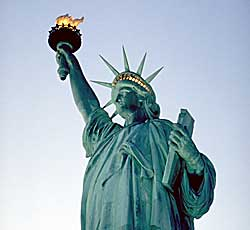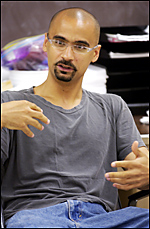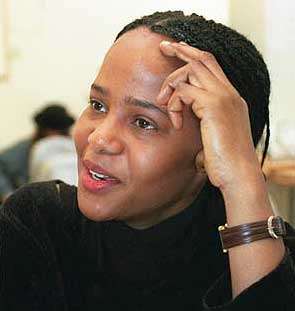 |
LITR 5831 Seminar in
World / Multicultural Literature:
American Immigrant Literature |
 |
 |

Junot Diaz, "How to Date a Browngirl . . . “ (IA
276-279)
Question for "How to Date a Browngirl" . . .
How does the main character-speaker seem like an immigrant, like a minority, or something in-between?
minority identity or experience
277 tear gas, mother recognized its smell from the year the United States invaded your island
276 that tia (extended family)
276 government cheese (association with "minority handouts" as opposed to "immigrant opportunity")
276 embarrassing photos of your family, half-naked kids, your cousins (strong connections to old world of home country)
277 sounds like a principal or a police chief (minorities often oppose dominant culture authority figures)
immigrant identity or experience
277 white ones are the ones you want the most (attraction to dominant culture, intermarriage)
+ 278 in truth, you love them more than you love your own
277 out-of-towners, blackgirls who grew up with ballet and Girl Scouts, three cars in driveways (further exploration of in-between identity)
277 if she’s a halfie don’t be surprised if her mother is white (intermarriage!)
277 your busted up Spanish (losing connection to home country, immigrant language)
278 never lose a fight on the first date
278 Uncle Tomming (selling out?)
278 black people . . . Dominicans (the usual questions about separate identity or assimilating identity)

Edwidge Danticat, “Children of the Sea” (IA 98-112)
98 nightmares
98 Haiti is just the way you left it
99 closed the schools since the Army took over
all the other youth federation members have disappeared
manman says hat butterflies can bring news
pregnant girl on board, face covered with scars
the hopelessness of the future in our country
I used to read a lot about America, university exams, Miami
no borderlines on the sea
100 lot of Protestants on this boat . . as Job or the Children of Israel, part the sea for us
some good wanga magic [a magical charm packet found in the folk magic practices of Haiti, and as such it is connected to the West African religion of Vodun, which in turn derives from the Fon people of what is now Benin.] syncretism
you have a name, you have a reputation
our neighbor madan roger came home with her son's head and not much else
the macoutes
101 charcoal layer of sunburn, x-mistaken for Cubans
some Cubans black too
took the Cubans to Miami and sent him back to Haiti
Beloved Haiti, there is no place like you. I had to leave
If I was a girl, maybe I would have been at home
102 all the American factories are closed
slapping me really hard
finally an African, even darker than your father
103 dreamt I died and went to heaven
starfishes and mermaids
make the son sleep with his mother, a daughter and father
104 you are an educated girl
104 feel like we are sailing for Africa
treat Haitians like dogs in the Bahamas . . . same African fathers
104 cf. slave ships
106 they are the law, law of the land, nothing we can do
sometimes hope is the biggest weapon of all to use against us
107 offering for Agwe, spirit of water
108 Do you remember our silly dreams?
my mother had a
kriz
111 live with Agwe at bottom of sea
112 another boat sank off the cost of the bahamas

Paule Marshall, “The Making of a Writer: From the Poets in the Kitchen” [handout]; Paule Marshall, “To Da-Duh, in Memoriam” (IA 368-377)
Paule Marshall, “To Da-Duh, in Memoriam” (IA 368-377)
“To Da-Duh”
368 ship that brought us from NY
alien sights and sounds of Barbados
caught between sunlight at her end of the building and the darkness inside-and for a moment she appeared to contain them both
white dress . . . sense of a past that was still alive
369 darkness . . . in her face
both child and woman, darkness and light, past and present, life and death--all the opposites contained and reconciled in her
369 wiped out the 15 years my mother had been away and restored the old relationship
369 not only did Da-duh prefer boys, but she also liked her grandchildren to be “white,” that is, fair-skinned . . . cousins, the outside children of / white estate managers
girl child takes after her father
370 why I don’t like to go anyplace with you St. Andrews people . . . You all ain’t been colonized”
371 the canes, as giant weeds
I longed for the familiar;A for the street in Brooklyn
St. Thomas canes
371 purchased it with Panama money sent her by her eldest son, my uncle Joseph, who had died working on the canal [colonialism]
372 the names of the trees as though they were those of her gods
my world did seem suddenly lacking
I bet you don't even know that these canes here and the sugar you eat is oen and the same thing. . . . some damn machine at the factory
inexplicably angry motion
I found myself in the middle of a small tropical wood . . . a violent place . . . earth smelled like spring
373 what's this snow like that you hear so much about
a dance called the Truck which was popular back then in the 1930s
as if I were a creature from Mars
374 refrigerators, radios, gas stoves . . .
I beat up a white girl
374 Beating up white people? Oh the lord, the world’s changing up so I can scarce recognize it anymore
375 Empire State Building
fight went out of her
like a Benin mask, ancient abstract sorrow
376 gazing out at the land as if it were already doomed
died during the famous '37 strike
England sent planes flying low over the island, in a show of force
377 I went to live alone
thunderous tread of machines
Compare Afro-Caribbean immigrants to Hispanic immigrants as "in-between" Immigrant and Minority status
Both Hispanics and Afro-Caribbeans are "New World" or "Inter-American" immigrants. Contrast these groups' varying backgrounds and impacts on racial issues.
Why do we know so little about the Caribbean?
1. So many different nations, each with specific history
2. Perhaps some repression of information from southern interests in the US, who may have shunned knowledge of African revolutions, slave revolts, and mixed-race identities.